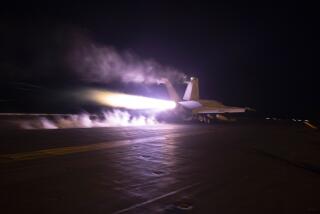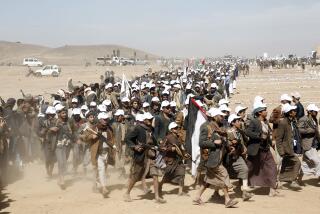FBI Uses Light Touch in Yemen Blast Probe
- Share via
ADEN, Yemen — For nearly two months they welded, they waited, they watched and they prayed.
They used at least five houses scattered around Aden’s yawning, crescent harbor, including a workshop where they built a boat engine with their landlord’s help, a lookout where they used binoculars to monitor the port, and a residence where they ate and slept while building a bomb so potent that it blew a 40-by-40-foot hole through half-inch-thick metal and humbled one of America’s most sophisticated floating war machines.
Those are among the details that Yemeni officials have let leak out in the 10 days since President Ali Abdullah Saleh mobilized his vast internal intelligence and security network to join forces with more than 100 FBI agents and investigate the bombing that killed 17 U.S. sailors and injured 39 others aboard the U.S. guided missile destroyer Cole.
The details are based on accounts from more than 2,800 Yemenis reportedly detained by security forces here--most of them later released--in what ranks among the most intensive investigations in the history of this impoverished Arab nation.
What remained a mystery Wednesday, as dozens of the FBI agents assigned to the case started heading home, was who “they” were, how many of them there were, and whether they were Yemenis or foreigners.
In an interview Wednesday night with the Saudi-owned MBC television network, Saleh said it was still too early to identify by name or nationality those who attacked the ship, though he said witnesses and a preliminary investigation indicate that one attacker might have been Egyptian.
But Yemeni officials have confirmed that the FBI has sent most of the key physical evidence gathered from the houses and elsewhere in the city and sea to more sophisticated forensic laboratories in the United States. Saleh has vowed in several recent interviews to pursue the bombers until they are caught and punished.
Yet as the U.S. began reducing its “footprint” and winding down the forensic phase of the FBI investigation in Aden, it was already clear that the probe has been a rare example of international investigative diplomacy.
Despite their large numbers here, few FBI agents have left their hotel. In deference to a nation that has been one of Iraq’s closest friends, FBI Director Louis J. Freeh took pains during his brief visit last week to describe his agency as a “junior partner” to Yemeni security, which has gathered most of the evidence and information and then delivered them to the agents at their hotel.
No FBI agents have been present during interrogation of witnesses or suspects by the Yemenis and none have worked the streets, officials of both governments confirmed. The FBI’s spokesman has yet to brief the press on anything since he arrived.
And while stressing how Yemeni collaboration contrasts with Saudi Arabia’s uncooperative stance after the yet-unsolved 1996 barracks bombing in Dhahran that killed 19 Americans, U.S. officials here have consistently refused to confirm or deny any details of the probe.
In fact, news of each incremental break in the case has come from Yemeni sources, and much of it has come from the president himself.
Saleh opened the widest window on the Cole investigation during a lengthy interview with Qatar’s Al Jazeera television last week.
Calling the bomb plot “an octopus of an operation that has been planned for a long time,” Saleh revealed the details of the boat-engine workshop, the fact that the suspects were Arabs who prayed, that one was bearded and wore glasses, that their car and boat trailer had been found and traced, and that they had stayed in Aden for six to eight weeks.
The origin of the bomb, Saleh indicated during Wednesday’s MBC interview, is now up to the Americans to determine. He repeated earlier comments that U.S. investigators told him it was made of a substance “only found in Israel, the U.S.A., and in a certain Islamic state and an Arab state whose names I do not wish to mention.”
Saleh, a fierce enemy of Israel who has publicly vowed to send arms, fighters and aid to the Palestinians in the days since the Cole bombing, was careful to cast the U.S. investigators and military personnel as brief visitors--not partners.
“We welcome them as guests to come and fix their ship,” he said. “There are 220 of them. Maybe it will take them two or three days or a week at the most, as I understand it, until they fix their ship and leave.”
As for his timetable in solving the case, Saleh concluded: “I believe that this is a premeditated operation, and to uncover it, both we and the Americans need to show patience. We managed to uncover the first part of the case. We will uncover the rest. We will discover who is behind it.”
More to Read
Sign up for Essential California
The most important California stories and recommendations in your inbox every morning.
You may occasionally receive promotional content from the Los Angeles Times.












